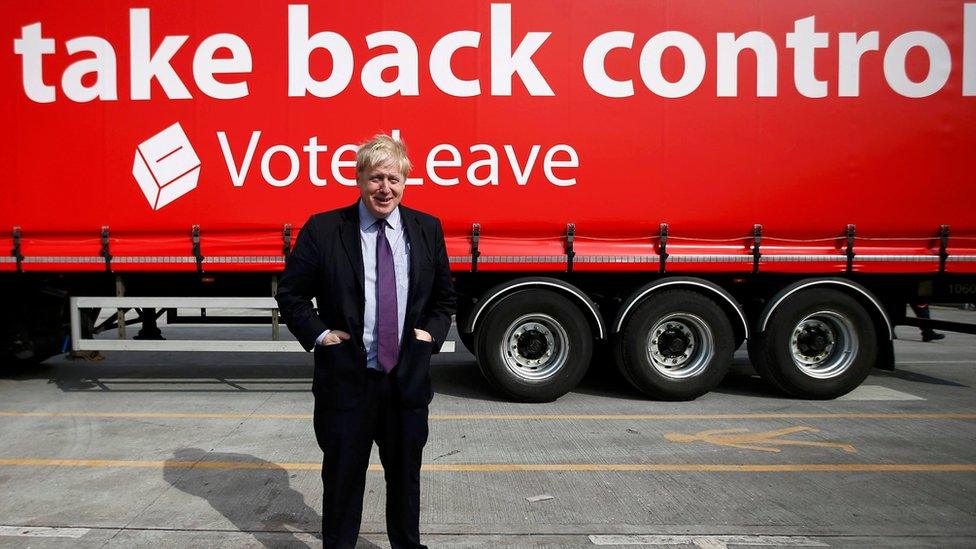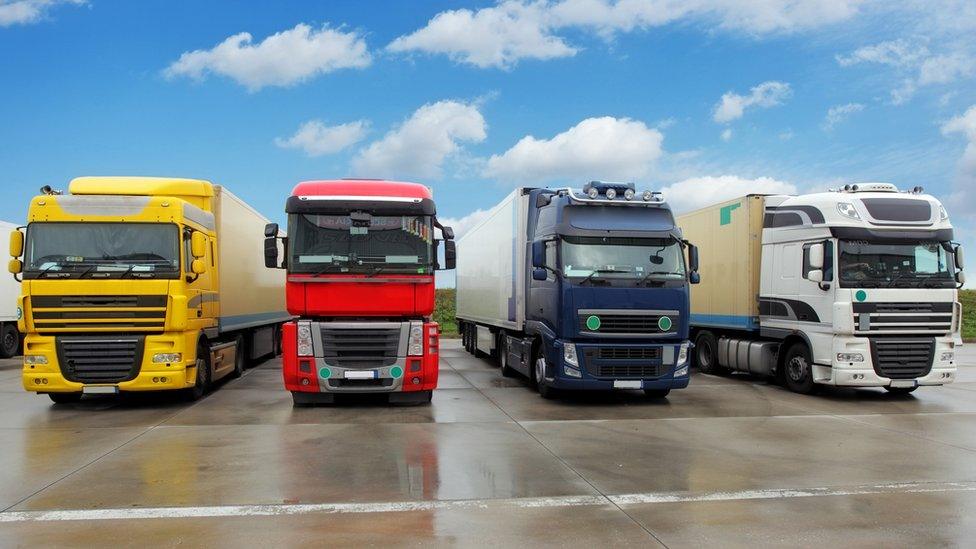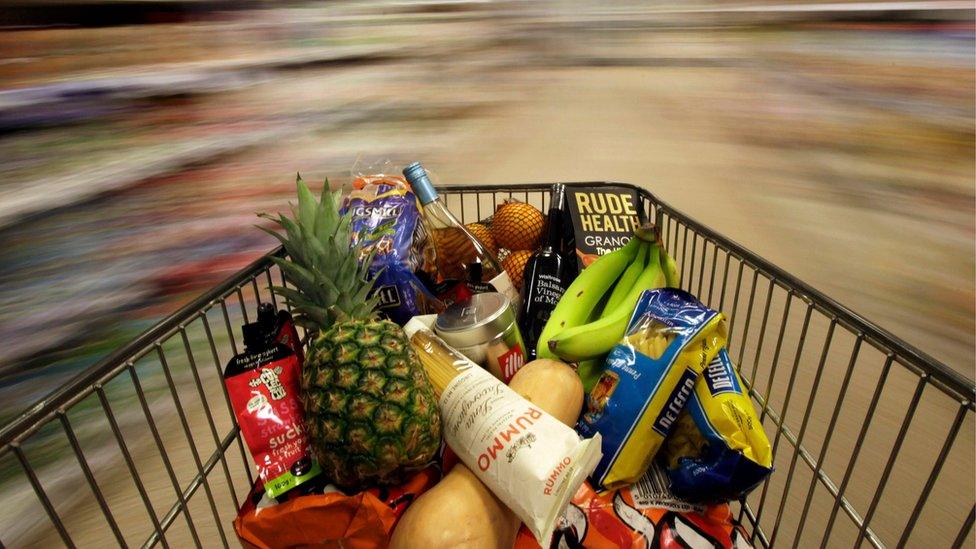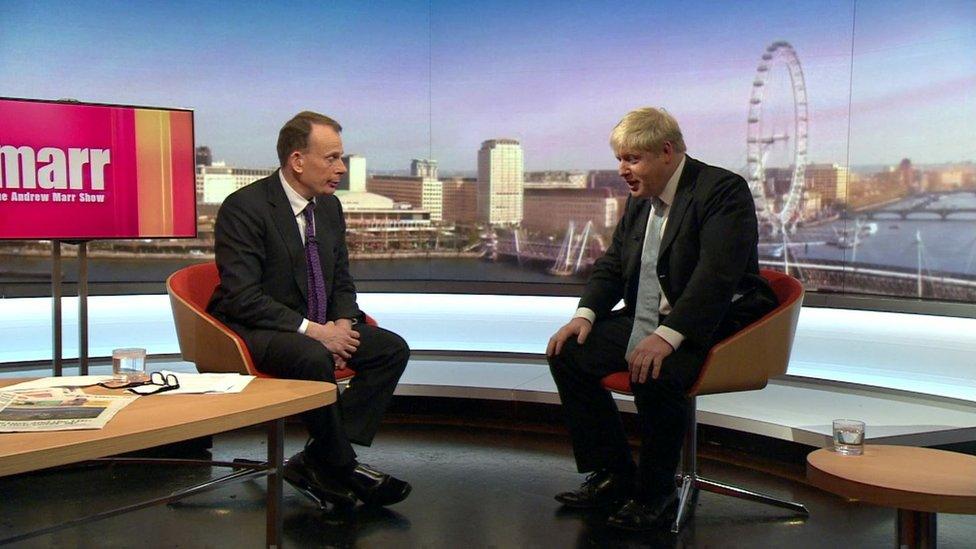Reality Check: Boris Johnson's claims about the EU
- Published

Freed from his responsibilities as Mayor of London, Leave campaigner Boris Johnson is giving a speech on Monday laying out the "cosmopolitan case for Brexit".
Later in the week, he will be starting a battle-bus tour of the UK.
So far in the EU referendum campaign, Mr Johnson has been keeping the Reality Check team busy and was criticised by a parliamentary committee for some of the claims he had made.

He first sent us scuttling off to our computers with some of the things he said upset him about EU rules, in the Telegraph on 22 February.

You cannot recycle a teabag
Now, we are assuming Mr Johnson meant you could not compost a teabag, because recycling them sounds like a really bad idea.
Under EU law, local authorities may indeed ban the composting of teabags, and any other sort of food waste, if they are worried about the spreading of certain diseases.
Cardiff Council did so in 2005 to prevent the spread of foot-and-mouth disease - it was worried food waste might have been in contact with infected meat.
But councils are not required to ban the composting of tea bags - they are allowed to.


Children under eight cannot blow up balloons
There were a number of headlines about this in October 2011, leading the European Commission to put out a press release saying, in shouty capitals: "EU DOES NOT ban children from blowing up balloons".
The rules require companies making latex (but not foil) balloons to carry a message saying: "Warning! Children under eight years can choke or suffocate on uninflated or broken balloons. Adult supervision required. Keep uninflated balloons from children. Discard broken balloons at once."
So, it is a compulsory warning rather than a ban.


Limits on the power of vacuum cleaners
Since 1 September 2014, there has been a ban on vacuum cleaners rated above 1.6 kW, to promote energy efficiency.
That limit is expected to be cut to 0.9 kW in 2017.
There has been much discussion among consumer groups and manufacturers about whether lower wattage will lead to reduced performance.
Which? warned at the time that five of its seven "best buys" would fail to meet the new standards.
But the German official testing agency Stiftung Warentest said it had found 38 models of cleaner that would work effectively within the new limits.
James Dyson wanted the limit to be even lower, at 0.7 kW, and objected strongly to the way the EU's tests had been carried out.


Blocks on improvements to the design of lorries
Mr Johnson said: "I discovered, in 2013, that there was nothing we could do to bring in better-designed cab windows for trucks, to stop cyclists being crushed.
"It had to be done at a European level, and the French were opposed."
The overall length of lorries is governed by EU regulations, resulting in small and flat-fronted cabs that maximise storage space.
But, thanks to campaigning by many people, including Mr Johnson, in April 2014, the European Parliament approved a change in the directive so that it would limit only the storage space and cabs could be more aerodynamic and cyclist-friendly.
At the time, Mr Johnson said he was worried the UK government would oppose the change, but it has now approved it.
The change will be phased in from 2018 - but it will take ages for all the lorries on the roads to be replaced by new ones.

Now, a few quick claims Mr Johnson made in a speech on 11 March:
Only 4% of officials in the EU Commission are British
Of a total of 32,966 staff currently working for the commission, 1,164 (3.5%) are UK nationals.
Youth unemployment is running at 22% on average in the eurozone
The most recent Eurostat figures suggest youth unemployment in the countries that use the euro is 22%, and 19.7% in the wider EU.

The EU's Common Agricultural Policy (CAP) adds £400 a year to the cost of food for every household
This figure comes from a report published by the Tax Payers' Alliance in 2009, which looked at the UK's share of the CAP budget as well as the effect on food prices.
It says each of those factors accounts for about half of the overall £400 figure.
The budget for the CAP then, quoted by the report, was €52bn (£42bn).
The report refers to a letter sent by the then Chancellor of the Exchequer, Alistair Darling, to other EU ministers in 2008, which said the elements of the CAP designed to keep food prices above world market levels cost EU consumers €43bn a year.
Put together with a few other smaller factors, the report estimated the total cost to the UK at £10.3bn, or £398 per household.
Since 2009, the CAP has been changed in ways that have probably reduced its effect on food prices, but it is very difficult to come up with a precise figure.
And the CAP budget has risen a bit - it will be €55.4bn in 2016.
But the bigger question is how much of this money would be saved if Britain left the EU.
That would depend on what system of farm subsidies Britain set up and whether it continued to impose tariffs on cheaper imports from the rest of the world.


Bigger tunnels for Crossrail
On 6 March, Mr Johnson told the BBC's Andrew Marr Show: "Such is the Stockholm syndrome capture of officials in this country that they decided to interpret the directive on the interoperability of trans-European networks in such a way as to insist that Crossrail tunnels had to be 50% bigger in order to accommodate German trains in the vanishingly unlikely eventuality of German trains needing to go down the Crossrail tunnel," he said.
"That would have cost billions, and we had to spend literally a year trying to fend off that demand."
But Transport for London then told the BBC's Newsnight programme: "The Crossrail programme was at an advanced stage when the directive was adopted by the UK.
"Crossrail construction commenced in 2009, tunnelling for Crossrail commenced in May 2012, with the final tunnel-boring machine concluding its journey in May 2015."
"The Department for Transport subsequently requested that Crossrail seek an exemption (derogation) from the Directive on Interoperability, which was successfully obtained in 2012.
"The administrative process to gain the derogation had no impact on the Crossrail construction programme."
These entries have previously appeared on the BBC Reality Check live page.



- Published22 February 2016
